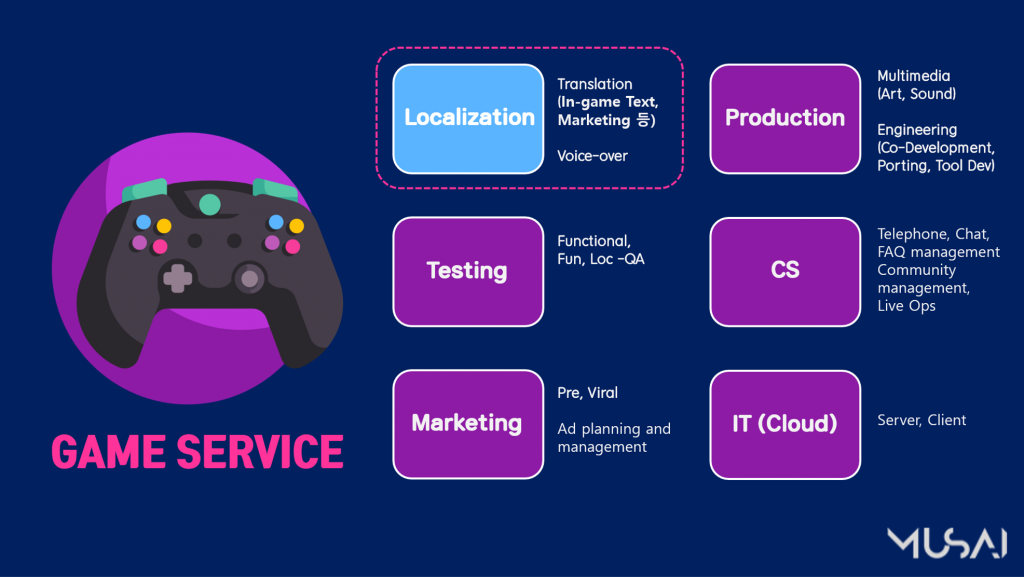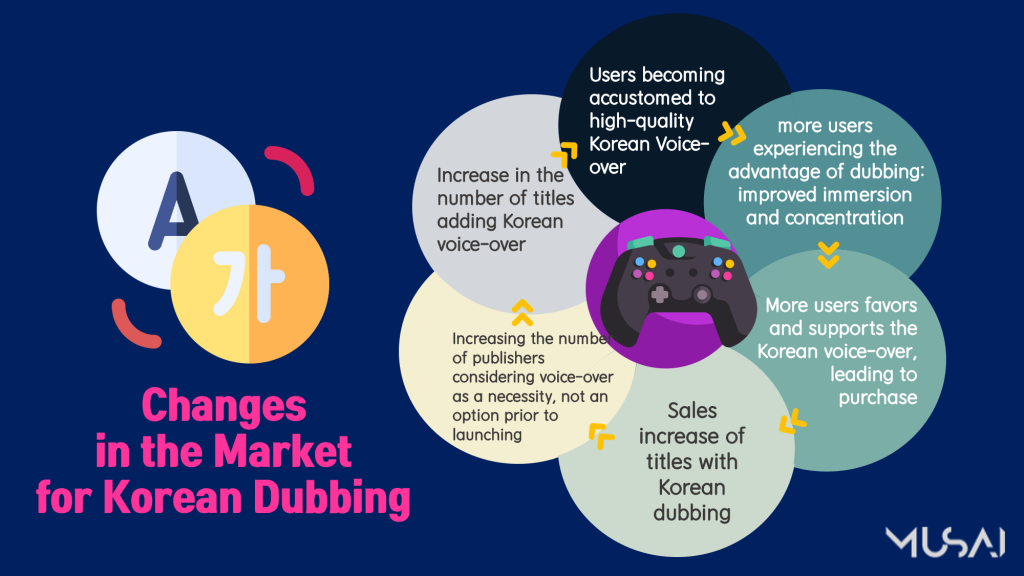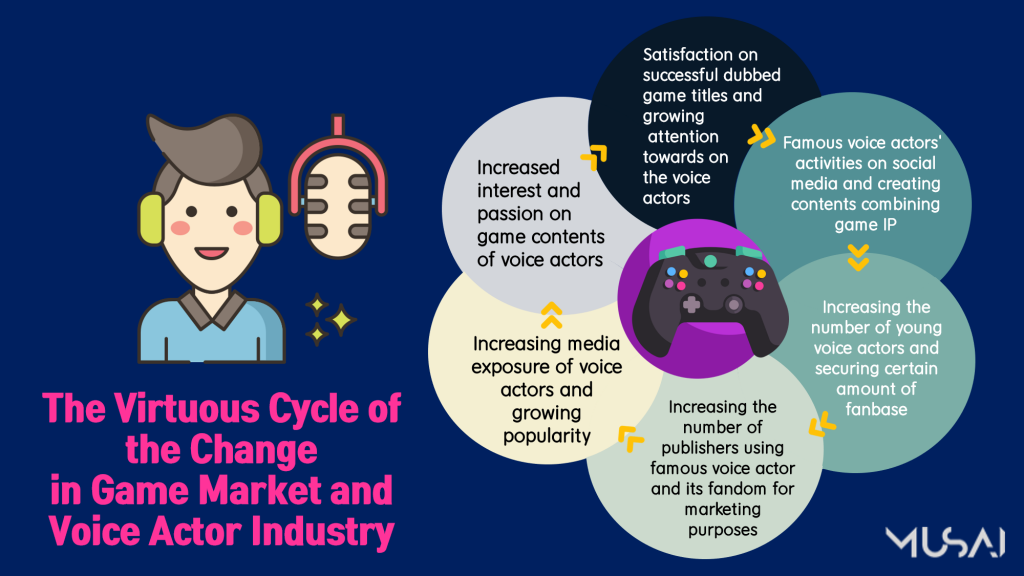[MUSAI] “The Wind of Change” Starting from ‘Cyberpunk 2077’ Blows Through the Korean Voice-over Industry

2021-03-05
The last article was on the change brought by the Korean dubbing of Cyberpunk 2077, and we’ve discovered why the gamers love the dubbed swearing words and call it a ‘fine dubbing,’ and its hidden contributor, script adaptation and translation as well.
▶ Hidden Contributor of ‘Cyberpunk 2077’ Korean Localization: Script Adaptation (feat. Secrets Behind the Effective Use of Slangs in Games) http://blog.musaistudio.com/musai-hidden-contributor-of-cyberpunk-2077-korean-localization-script-adaptation-feat-secrets-behind-the-effective-use-of-slangs-in-games
With today’s article, we will continue looking into how the perspective on the Korean game-dubbing has changed, and the virtuous cycle it is creating.
Intro. The Area of Game Related Service and Game Localization
The ‘localization’ part of game-related services is consisted as follows:
Game Localization
- In-game Text
- Multimedia: Image, Video, Voice-over
- Localization Testing
- Server & Client documents
- Customer Support

Until now, ‘game localization’ was considered as a synonym for ‘game text localization,’ and voice-over part, the multimedia, only came second; since the users’ response was polarizing, the publishers or developers was hard to decide whether to add voice-over or not.
The Perception of Korean Voice-over
The perception of Korean Voice-over was as follows:
From the publisher’s point of view, voice localization was a mere option unless it was absolutely necessary due to the game’s property or other specific reasons; many thought in-game text translation is sufficient in terms of gaming localization. In addition, voice localization takes lot more budget and quality control is much harder than in-game text translation, since it is more difficult to adjust the text length, file format, etc., and the voice localization process required to be conducted under much more strict conditions. Moreover, additional cooperation between various related departments (ex. cooperating with an in-house audio team and a marketing team for quality check and voice-actor related marketing, etc.) and outsourcing studio management are also necessary, which means inconvenient in the management aspect.
On the users’ point of view, on the other hand, to the majority of Korean gamers, original language + subtitle was considered as a ‘national rule’ for playing games, since they are accustomed to playing with the original language, with captions on. Moreover, even if vocal localization were decided, game titles that could not afford the high budget of voice-over would choose to proceed with whatever the small budget they can afford, resulting in offering fewer opportunities to the users to experience high-quality voice-over in games. Thus, it rather acted as a negative factor that decreases the level of immersion users can experience, and some users complained that they are dissatisfied by the same voice they hear repeatedly due to the limited number of voice actors in Korea.
‘Cyberpunk 2077,’ Changes the Perspective of Korean Voice-over
In recent couple of years including ‘Cyberpunk 2077,’ the perspective of Korean dubbing has been significantly changed. The changes we could have felt through the following users’ feedback (reference: http://blog.musaistudio.com/musai-user-response-analysis-article-more-than-half-54-of-gamers-prefer-the-korean-dubbed-version-of-cyberpunk-2077) and via communicating with publishers or developers are followed below.
- Users adapting to Korean-dubbed voice. More users commenting that they experience deeper level of immersion and could focus on gameplay
- More users in favor with Korean dubbing and increased their support
- Increased fanbase of Korean voice actors using social media
- Such preference affecting the sales of titles, leading to increase in purchase rate
- More publishers considering Korean dubbing on launch
Such phenomenon is creating a virtuous cycle in the game industry:

Korean Dubbing, Surpasses Traditional Marketing Strategies
Clients releasing games with Korean voice-over will gain additional marketing advantages.
In the past, the marketing strategy was very limited to such as filming the behind-the-scenes footage from the recording site or sharing video of the voice actors showing support. With too many publishers using such strategy, it became cheesy and ineffective. However, with the change on the perception of game dubbing, the fact that the game is being voiced over itself is a powerful tool to draw users’ attention. Now, dubbing not only surpasses traditional marketing strategies, but also extends the popularity of the game title itself, as some voice actors shares their video clips created using the game characters he/she participated, and even some users produce dubbing-related contents and memes on, for example, comparing dubbings from other counties or dubbing the videos themselves.
The Effect from the Change on Korean Voice-over, How Far Does It Extend to?
(1) Marketing cost efficiency: Publishers tend to consider favorably or even go on and add voice-over; compared to the short-term and competitive effect the media advertisement can offer, dubbing can help both pre-launch marketing and lead to sales increase after launch. Recently, many promotional articles announcing addition of Korean voice-over are published on game media.

(2) More games targets voice-over: Previously, only the most popular game titles added voice-over, but the atmosphere is spreading to less-popular games; the games with less popularity which its success is not guaranteed are also now deciding to proceed on Korean dubbing, as it is also used as a way to convey the message that they respect Korean users.
(3) Increase in the fanbase of voice actors: Among the fandom of domestic voice-actors, which were originally constituted mainly by animation fans, people supporting the game characters are increasing and the voice talents are growing more popular. The number of cases of voice actors creating personal contents using game characters is also increasing. As a result, the growing attention and demand for game dubbing is creating a virtuous cycle with the voice actor industry as well. (reference: Image 4-2)


(4) More Chinese game titles adding Korean voice-over: Most of the titles go through voice localization was in English, with a few Japanese titles adding to the number. However, the cases of Chinese games proceeding voice localization are increasing rapidly. 3-4 years ago, Chinese games adding voice-over broadly fell into following two cases: 1) A large Korean publisher buys the copyright of a game, proceeding with dubbing or 2) Chinese developer proceeding on their own. In the former case, the quality was not so bad, but in the latter case, it was hard to expect a high-quality dubbing due to budget constraints and so the users’ response was unfavorable in many cases accordingly. However, with highly anticipated and popular Chinese titles being released, the quality control has become much more important component on voice localization recently. With the increasing the number of users supporting the Korean dubbing of Chinese games, the trend is expected to continue on the rise.
In Conclusion. The Efforts of Localization Agency to Deliever the Best Quality
The voice localization market will continue to expand in accordance with the virtuous cycle mentioned above, and this is undoubtedly a good thing. However, it also means more efforts are required for the people who are now working in the localization industry; users will become increasingly accustomed to the high-quality game dubbings and the expectation of the market will also raise. If such expectation is not fulfilled, it will be inevitable to bear harsh criticism from gamers and the mass media.
We, Musai Studio, pride ourselves on having contributed to raise the anticipation of the localization market by providing high-quality voice-over services. We will continue doing our best and assure the quality to deliver the best localization services.
** Did you enjoy the news of Musai? Please click subscribe and share the story.
BOOST YOUR PLAY! Musai Studio







